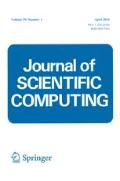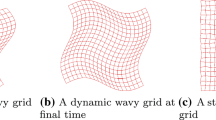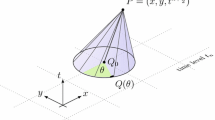Abstract
In this paper we study a Lax-Wendroff-type time discretization procedure for the finite difference weighted essentially non-oscillatory (WENO) schemes to solve one-dimensional and two-dimensional shallow water equations with source terms. In order to maintain genuinely high order accuracy and suit to problems with a rapidly varying bottom topography we use WENO reconstruction not only to the flux but also to the source terms of algebraical modified shallow water equations. Extensive simulations are performed, as a result, the WENO schemes with Lax-Wendroff-type time discretization can maintain nonoscillatory properties and more cost effective than that with Runge-Kutta time discretization.
Similar content being viewed by others
References
Aràndiga, F., Belda, A.M., Mulet, P.: Point-value WENO multiresolution applications to stable image compression. J. Sci. Comput. 43, 158–182 (2009)
Balsara, D.S.: Divergence-free reconstruction of magnetic fields and WENO schemes for magnetohydrodynamics. J. Comput. Phys. 228, 5040–5054 (2009)
Balsara, D.S., Shu, C.W.: Monotonicity preserving weighted essentially non-oscillatory schemes with increasingly high order of accuracy. J. Comput. Phys. 160, 405–452 (2000)
Cai, Y., Navon, I.M.: Parallel block preconditioning techniques for the numerical simulation of the shallow water flow using finite element methods. J. Comput. Phys. 122, 39–50 (1995)
Chleffi, V., Valaini, A., Zanni, A.: Finite volume method for simulating extreme flood events in natural channels. J. Hydraul. Res. 41, 167–177 (2003)
Goutal, N., Maurel, F.: In: Proceedings of the Second Workshop on Dam-BreakWave Simulation. Technical Report HE-43/97/016/A. Electricité de France, Département Laboratoire National Hydraulique, Groupe Hydraulique Fluviale (1997)
Harten, A., Engguist, B., Osher, S., Chakravarthy, S.: Uniformly high order essentially non-oscillatory schemes, III. J. Comput. Phys. 71, 231–303 (1987)
Jiang, G.S., Shu, C.W.: Efficient implementation of weighted ENO schemes. J. Comput. Phys. 126, 202–228 (1996)
LeVeque, R.J.: Balancing source terms and flux gradients in high-resolution Godunov method: the quasi-steady wave-propagation algorithm. J. Comput. Phys. 346, 146 (1998)
Liu, X.D., Osher, S., Chan, T.: Weighted essentially non-oscillatory schemes. J. Comput. Phys. 115, 200–212 (1994)
Qiu, J.X., Shu, C.W.: Finite difference WENO schemes with Lax-Wendroff-type time discretizations. SIAM J. Sci. Comput. 24, 2185–2198 (2003)
Ricchiuto, M., Abgrall, R., Deconinck, H.: Application of conservative residual distribution schemes to the solution of the shallow water equations on unstructured meshes. J. Comput. Phys. 222, 287–331 (2007)
Rogers, B.D., Borthwick, Alistair G.L., Taylor, P.H.: Mathematical balancing of flux gradient and source terms prior to using Roe’s approximate Riemann solver. J. Comput. Phys. 192, 422–451 (2003)
Shu, C.W.: Essential non-oscillatory and weighted essentially non-oscillatory schemes for hyperbolic conservation laws. In: Cockburn, B., Johnson, C., Shu, C.W., Tadmor, E. (eds.) Advanced Numerical Approximation of Nonlinear Hyperbolic Equations. Lecture Notes in Mathematics, vol. 1697, pp. 325–432. Springer, Berlin (1998). A. Quarteroni (ed.)
Vukovic, S., Sopta, L.: ENO and WENO schemes with the exact conservation property for one-dimensional shallow water equations. J. Comput. Phys. 179, 593–621 (2002)
Xing, Y.L., Shu, C.W.: High order finite difference WENO schemes with the exact conservation property for the shallow water equations. J. Comput. Phys. 208, 206–227 (2005)
Zahran, Y.H.: An efficient WENO scheme for solving hyperbolic conservation laws. Appl. Math. Comput. 212, 37–50 (2009)
Zhou, J.G., Causon, D.M., Mingham, C.G., Ingram, D.M.: The surface gradient method for the treatment of source terms in the shallow water equations. J. Comput. Phys. 168, 1–25 (2001)
Zhu, J., Qiu, J.X.: Hermite WENO schemes and their application as limiters for Runge-Kutta discontinuous Galerkin method, III: unstructured meshes. J. Sci. Comput. 39, 293–321 (2009)
Author information
Authors and Affiliations
Corresponding author
Additional information
The research of C. Lu was supported by NSFC 40906048 and Science research fund of Nanjing University of Information Science & Technology 20090203. The research of J. Qiu was supported by NSFC 10931004.
Rights and permissions
About this article
Cite this article
Lu, C., Qiu, J. Simulations of Shallow Water Equations with Finite Difference Lax-Wendroff Weighted Essentially Non-oscillatory Schemes. J Sci Comput 47, 281–302 (2011). https://doi.org/10.1007/s10915-010-9437-3
Received:
Revised:
Accepted:
Published:
Issue Date:
DOI: https://doi.org/10.1007/s10915-010-9437-3




